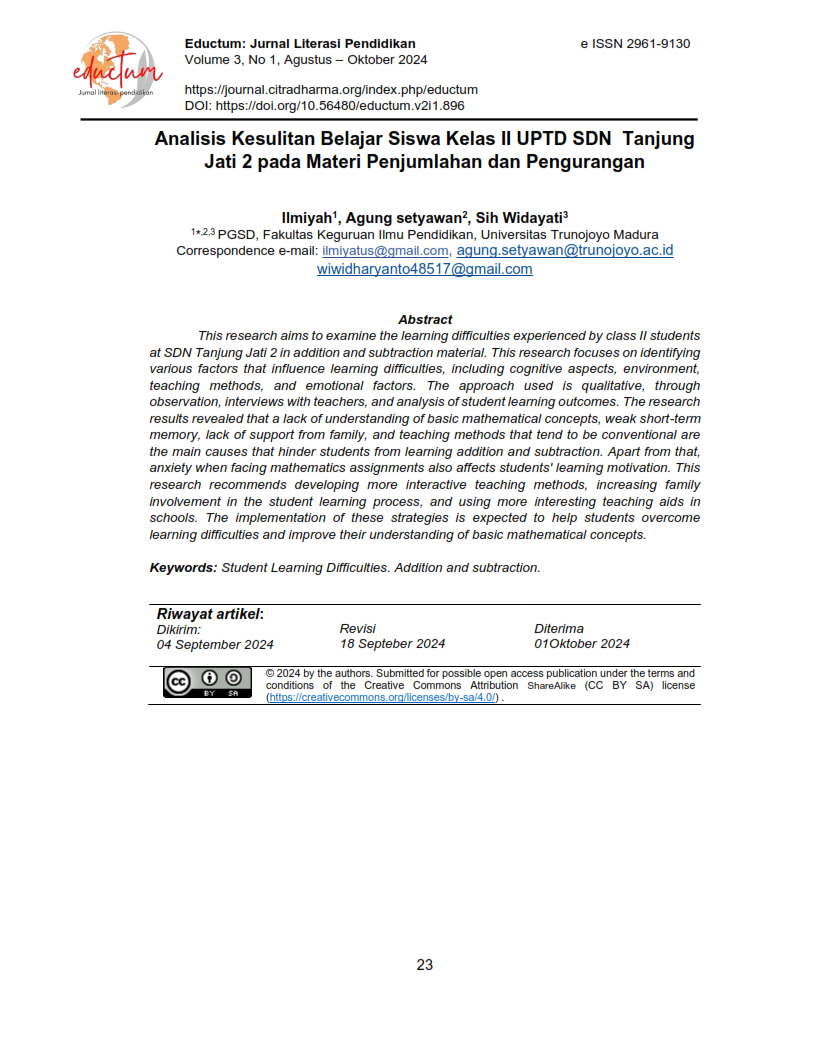Analisis Kesulitan Belajar Siswa Kelas II UPTD SDN Tanjung Jati 2 pada Materi Penjumlahan dan Pengurangan
DOI:
https://doi.org/10.56480/eductum.v3i1.1165Keywords:
Mathematics Learning Difficulties, Addition and Subtraction Challenges, Interactive Teaching MethodsAbstract
This research aims to examine the learning difficulties experienced by class II students at SDN Tanjung Jati 2 in addition and subtraction material. This research focuses on identifying various factors that influence learning difficulties, including cognitive aspects, environment, teaching methods, and emotional factors. The approach used is qualitative, through observation, interviews with teachers, and analysis of student learning outcomes. The research results revealed that a lack of understanding of basic mathematical concepts, weak short-term memory, lack of support from family, and teaching methods that tend to be conventional are the main causes that hinder students from learning addition and subtraction. Apart from that, anxiety when facing mathematics assignments also affects students' learning motivation. This research recommends developing more interactive teaching methods, increasing family involvement in the student learning process, and using more interesting teaching aids in schools. The implementation of these strategies is expected to help students overcome learning difficulties and improve their understanding of basic mathematical concepts.
References
Ananda, E. R., & Wandini, R. R. (2022). Analisis Perspektif Guru dalam Mengatasi Kesulitan Belajar Siswa pada Pembelajaran Matematika Sekolah Dasar. Jurnal Basicedu, 6(3). https://doi.org/10.31004/basicedu.v6i3.2773
Anggita, A. F., Maulida, D. N., & Harahap, S. H. (2024). Pembelajaran Sastra: Problematika Pembelajaran Drama bagi Guru dan Siswa di SMP Negeri 17 Medan. IJEDR: Indonesian Journal of Education and Development Research, 2(1). https://doi.org/10.57235/ijedr.v2i1.1830
Apriandini, I., Novani, D., Amelia, A., Sari, S. N., & Alpian, Y. (2024). Identifikasi Faktor Kesulitan Belajar Membaca Siswa di Kelas VI di SDN Karangpawitan III. El-Mujtama: Jurnal Pengabdian Masyarakat , 4(3). https://doi.org/10.47467/elmujtama.v4i3.1598
Arifin, M. F. (2020). KESULITAN BELAJAR SISWA DAN PENANGANANNYA PADA PEMBELAJARAN MATEMATIKA SD/MI. Jurnal Inovasi Penelitian, 1(5). https://doi.org/10.47492/jip.v1i5.181
Aulia, A., Putri, A. A., & Kowiyah, K. (2024). Analisis Kesulitan Belajar Matematika pada Materi Bilangan dan Pengukuran Siswa Kelas II Sekolah Dasar Jakarta. Jurnal Pendidikan Matematika, 1(2). https://doi.org/10.47134/ppm.v1i2.305
Dwi Ari Pratiwi, K. A., Ayu Purnami, N. M., & Numertayasa, I. W. (2024). Pendampingan Belajar Berhitung Siswa Kelas 2 Melalui Penggunaan Media Kartu Angka. Jurnal Pengabdian Kepada Masyarakat Nusantara, 5(1). https://doi.org/10.55338/jpkmn.v5i1.2573
Idayanti, Z., Suleman, Muh. A., Najib, M., Nisa, A. K., & Prasetyo, A. E. W. A. (2024). Upaya Guru dalam Mengatasi Kesulitan Membaca dan Menulis Siswa Kelas I dan II Sekolah Dasar. Ideguru: Jurnal Karya Ilmiah Guru, 9(2). https://doi.org/10.51169/ideguru.v9i2.817
Jumiati, Lutviana Wahyu Febriyanti, & Irega Gelly Gera. (2024). Analisis Kesulitan Mata Pelajaran Matematika SD Pada Materi Bangun Datar Sudut Pandang Jerome Brunner. Journal of Global Research Education, 1(1). https://doi.org/10.62194/92kd8t33
Nafisyah, C. L., Zawawi, I., & Huda, S. (2024). Analisis Kemampuan Komunikasi Matematis Peserta Didik Ditinjau dari Gaya Belajar Honey-Mumford. JIIP - Jurnal Ilmiah Ilmu Pendidikan, 7(1). https://doi.org/10.54371/jiip.v7i1.3873
Nisa Iftita Maharani, N. I. M. (2024). Analysis of Socio-emotional Development in Mathematics Learning Through Multi-representative Based Test Instruments. Jurnal Riset Pendidikan Matematika Jakarta, 6(1). https://doi.org/10.21009/jrpmj.v6i1.29022
Nuraeni, N., & Syihabuddin, S. A. (2020). Mengatasi Kesulitan Belajar Siswa dengan Pendekatan Kognitif. Jurnal BELAINDIKA (Pembelajaran Dan Inovasi Pendidikan), 2(1). https://doi.org/10.52005/belaindika.v2i1.24
Oktafiana, N., Rasidi, R., Wardana, A. E., & Isnuryani, N. (2024). Penerapan Metode Fun Learning dalam Meningkatkan Motivasi Belajar Bahasa Jawa Siswa Kelas V SD Negeri Percobaan 2 Depok. Al-Madrasah: Jurnal Pendidikan Madrasah Ibtidaiyah, 8(1). https://doi.org/10.35931/am.v8i1.3159
Sari, N., Neltiana, S., & Yulia, P. (2024). Pendampingan Kesulitan Belajar Matematika Materi Al-Jabar Pada Siswa Siswi SMP Negeri 14 Kerinci Kelas VII. PRAXIS: Jurnal Pengabdian Kepada Masyarakat, 2(3). https://doi.org/10.47776/praxis.v2i3.799
Suryanti, S., Sidik, R. S. R., Pramesti, C., & Sari, A. S. L. (2024). PENDAMPINGAN TRY OUT PADA SISWA SEBAGAI ASSESSMENT BELAJAR MATEMATIKA. Jurnal Kreativitas Dan Inovasi (Jurnal Kreanova), 4(1). https://doi.org/10.24034/kreanova.v4i1.6242
Triana, A. (2024). Analisis Model Rasch pada Tes Diagnostik Kesulitan Belajar Matematika Siswa SMA. Jurnal Tarbiyah Dan Ilmu Keguruan Borneo, 5(1). https://doi.org/10.21093/jtikborneo.v5i3.7135
Zuschaiya, D. (2024). Faktor yang Memengaruhi Minat dan Kesulitan Belajar Matematika Siswa Tingkat Sekolah Dasar. Sanskara Pendidikan Dan Pengajaran, 2(01). https://doi.org/10.58812/spp.v2i01.314

Downloads
Published
Issue
Section
License
Copyright (c) 2024 Ilmiyah Ilmi, Agung Setyawan, Sih Widayati

This work is licensed under a Creative Commons Attribution-ShareAlike 4.0 International License.
Authors who publish with this journal agree to the following terms:
- Authors retain copyright and grant the journal right of first publication with the work simultaneously licensed under a Creative Commons Attribution-ShareAlike 4.0 International License that allows others to share the work with an acknowledgment of the work's authorship and initial publication in this journal.
- Authors are able to enter into separate, additional contractual arrangements for the non-exclusive distribution of the journal's published version of the work (e.g., post it to an institutional repository or publish it in a book), with an acknowledgment of its initial publication in this journal.
- Authors are permitted and encouraged to post their work online (e.g., in institutional repositories or on their website) prior to and during the submission process, as it can lead to productive exchanges, as well as earlier and greater citation of published work (See The Effect of Open Access).

This work is licensed under a Creative Commons Attribution-ShareAlike 4.0 International License.
Deprecated: json_decode(): Passing null to parameter #1 ($json) of type string is deprecated in /home/citra-dharma-journal/public_html/plugins/generic/citations/CitationsPlugin.inc.php on line 49













